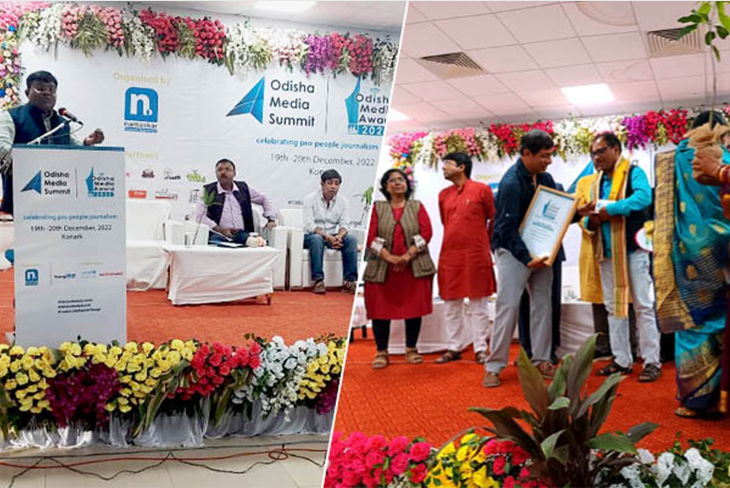With Radio Namaskar and Young India, ActionAid Association organised Odisha Media Summit and Odisha Media Award – 2022 on December 19-20, 2022, in Konark, Odisha. Nearly 300 people from 20 districts of the state, including community radio reporters, community-based human rights defenders and several senior journalists and academicians, attended the two-day event.
The Odisha Media Summit provided communities and media professionals with a platform to discuss contemporary issues and engage in constructive and meaningful debates. Held as part of the summit, the Odisha Media Award celebrates pro-people journalism and felicitates journalists championing people’s causes through media.
As part of the summit, ActionAid Association also shared findings from ‘Lost to the Sea’ – a recent study in Odisha to understand the vulnerabilities of coastal communities affected by climate change-induced seawater intrusion and displacement. We also explored existing adaptive and coping strategies coastal communities employ to deal with the issue. Across five coastal districts, namely, Bhadrak, Ganjam, Jagatsinghpur, Kendrapara and Puri, the study covered 23 villages displaced due to seawater intrusion. The survey analysed the shifting climate trends, the increasing frequency and intensity of natural disasters, and their impact on the local economy and the lives and livelihoods of communities cross-generationally.
The study found that the coastal communities are battling rising sea levels, erosion of shores, and disappearing natural buffer zones, including forest barriers and mangrove ecosystems, due to increased land salinity, deforestation and disaster damage. While small and marginal farmers in these districts face crop losses due to seawater intrusion and increased agricultural land salinity, the fisherfolk must deal with the loss of sea-based fishing livelihoods. The lack of alternative livelihood options has resulted in affected communities being forced into distress migration and becoming climate refugees. The study also found a rise in unregulated and unsustainable prawn cultivation for the export market. In addition, the survey pointed to the increase in the incidence and severity of natural disasters since 1999.
During the study, several recommendations emerged from within the affected communities to mitigate the impact of the climate crisis and strengthen community resilience. Suggestions included creating reforestation projects, formulating schemes to incentivise work that serves the local market and involving communities in building better infrastructure in their villages through projects under the Mahatma Gandhi National Rural Employment Guarantee Act (MGNREGA). However, the primary concern was for the State Government to take urgent note of coastal erosion, rising salinity and the resultant displacement of communities. Then prioritise planning towards resilience-building and allocate required resources and implement such projects.
Participants in the study expressed the strong need to involve local communities, including women, youth, Panchayat representatives and community radio reporters, in resettlement and rehabilitation plans. In addition, communities urged the Government to adopt an appropriate loss and damage framework, factoring in the loss of land to the sea, increased salinity of agricultural land and loss of livelihoods. Support of farming activities, disaster-resilient housing, access to safe drinking water and other basic amenities were among the other significant issues raised.

